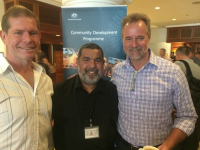Murrumu Walubara Yidindji lauds Australia’s Indigenous affairs minister who discussed treaty with the Yidindji cabinet at a summit in Cairns
Photo: The Yidindji attorney general, Gaarn-Yarra Yalmabara, the foreign affairs and trade minister, Murrumu Walubara Yidindji, and the Australian Indigenous affairs minister, Nigel Scullion. Photograph: Murrumu Walubara Yidindji
The self-declared sovereign Yidindji government has been buoyed by a “diplomatic exchange” with a senior Australian government minister who offered the first commonwealth recognition of its leaders at an event on their traditional country in north Queensland.
The Indigenous affairs minister, Nigel Scullion, acknowledged the presence of the Yidindji cabinet while speaking to more than 100 delegates at a national development summit in Cairns on Tuesday.
The Yidindji cabinet is composed of the foreign affairs and trade minister, Murrumu Walubara Yidindji – a former National Indigenous Television Canberra press gallery journalist who renounced his Australian citizenship to live under tribal law in 2014 – and its attorney general, Gaan-Yarra Yalmabara.
They later lauded Scullion for his constructive response when they raised with him the matter of a treaty with the commonwealth.
The commonwealth has not struck a treaty with any Indigenous nation since the European invasion of 1788.
The exchange with the minister is the latest twist in the tale of Murrumu, whose adoption of tribal over Australian law has led to encounters with authority figures, from magistrates to the police officers who booked him for driving under Yidindji licence plates last year.
Murrumu upon his arrest referred the matter to his attorney-general.
Murrumu has sought to highlight what he and many other Indigenous activists regard as a serious error of law that must be “cured”.
This is that Indigenous nations, despite their dispossession and now legal recognition of their traditional ownership of country, never ceded sovereignty.
Murrumu said Scullion, whom he regarded as a “good friend” from his time in Canberra when he was known as Jeremy Geia, had suggested a treaty was “something we can certainly work on”.
“We’re friendly. We don’t want one Australian dollar, we told him, because that’s for Australians,” he said.
“[But] if Yidindji are the owners, and he’s acknowledging us as traditional owners, what does the commonwealth of Australia own?
“We want the commonwealth of Australia to stay here and play ball with us but there’s got to be some sort of formal agreement so we can help cure the error in law.”
A spokesman for Scullion said the senator had told the Yidindji leaders that “sovereignty was a difficult issue to deal with and that his ongoing discussions with the cabinet led to a greater understanding of what may and may not be possible”.
Gaan-Yarra applauded Scullion for addressing the treaty issue directly with them and noted he “hadn’t ruled it out”.
“Scullion said they are challenging, very challenging, there’s a lot of work involved,” he said.
“But in saying that at least he had the courage and strength to say that; everyone else is ducking and diving from it.”
Scullion’s address to the summit followed a welcome to country by another Yidindji traditional owner. The Yidindji nation’s country includes parts of Cairns, or Gimuy.
The Northern Territory senator’s address was significant because it contained “the first acknowledgement from the commonwealth side of the true Yidindji cabinet being there”, Gaan-Yarra said.
“Especially when he’s up in front of the department of prime minister and cabinet staff saying those words.”
The spokesman for Scullion said the minister was “committed to the constitutional recognition process being undertaken through the referendum council”, which may see the Australian constitution rewritten to formally acknowledge the founding role of one of the world’s oldest living cultures.
Some Indigenous activists have advocated for a treaty – which relates to the concept of sovereignty – as a goal more urgent than constitutional recognition.
A treaty was promised by the former prime minister Bob Hawke in 1988 but never delivered.


NACCHO Aboriginal Health News
Evidence-based nutrition programs are required urgently in urban, rural and remote locations. - We can’t close the gap on health unless we talk about nutrition - Sugary soft drinks ‘killing the population’ in remote Aboriginal communities - “Unless government policy targets Indigenous health as a priority, it will continue to struggle to get kids into school and adults into jobs.” - “A ‘whole of system’ approach to kidney health and access to affordable, healthy food in remote communities is critical to preventing the onset of kidney disease and diabetes.” - New app makes it easier to find Aboriginal alcohol treatment services - “The most effective strategies for combating volatile substance abuse improve young peoples’ lives and the wellbeing of families and communities over the long term.” - Indigenous children and young people are over one and a half times more likely to have injuries requiring hospitalisation compared to other Australians in the same age-range. - “First Australians continue to bear the brunt of racism and discrimination."